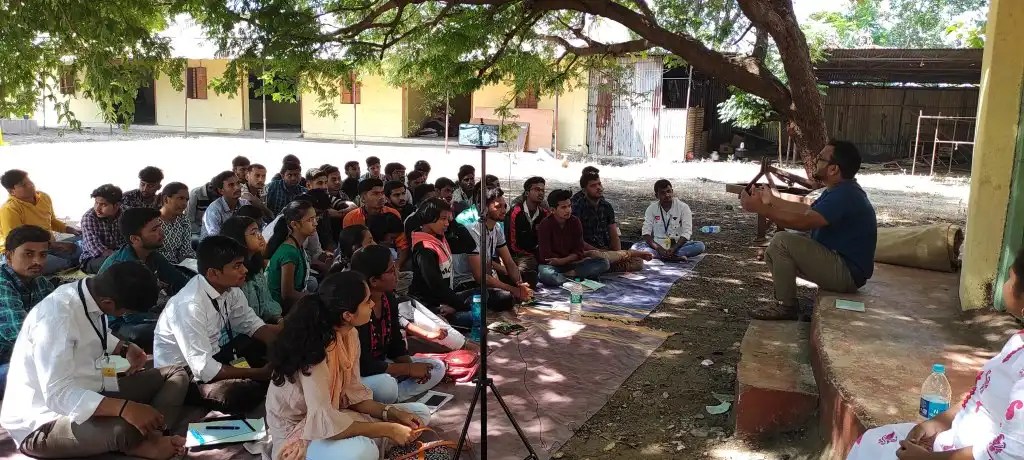By Raju Kendre
India faces a significant decline in school enrollment, with 15 million fewer students in 2023-2024 than previous years. While literacy rates among Scheduled Castes (SCs) remain low at 66.1%, far below the national average. Despite the increased number of educational institutes, the quality of education for SC/ST students remains poor. According to reports, Indian enrolment in higher education lies below the world average. In fact, only three out of ten Indians pursue higher education.
Without quality higher education, all is lost. You cannot sustain generations when the quality of education offered is sub-par. Most educational colleges, institutes, and universities in the country offer education that is sub-par, without ever going to class, without anyone ever teaching you, or without writing exams, you can get your degrees. On the receiving end of such education are SC, ST, and nomadic community students in particular, who without access to quality education, resources, or knowledge, make do with such education. In such circumstances, education is not a right, but a privilege you have to fight for every single day.
I had to drop out due to my socio-economic conditions
This is not fiction, but my own story of all the experiences I suffered and overcame. Due to my socio-economic conditions, I dropped out of undergraduate degree and was forced to continue my education through distance learning. After dropping out, while volunteering in a very remote tribal belt of Melghat, I saw children fighting to get primary-secondary education, walking miles to attend school, and generations trapped in poverty because they had no access to opportunities. This first-hand experience, combined with my own journey, sparked my passion to create real change.
I realised that to overcome these problems, you need to inspire underprivileged groups by increasing their representation in quality education both in India and abroad. By creating role models from these communities, we can inspire leadership from the ground up. Diverse representation fosters innovative thinking and varied perspectives, which are essential for addressing systemic inequities and building a more inclusive and equitable education system.
Determined to make positive change, I launched Eklavya India Foundation, to prepare students for higher education in premium universities. What started with just seven students has sparked into 700 students, who are enrolled in our year-long dedicated mentorship programs.
At Eklavya India Foundation, our mission is to empower historically marginalized communities by breaking down educational and career barriers, promoting equitable leadership and socio-economic mobility. We envision a fair society where everyone has an equal opportunity to succeed. Our programs offer mentorship, residential training, scholarships, workshops, and exposure tours to expand access to higher education and leadership opportunities.
Our impact has been significant. We have conducted hundreds of workshops, reaching over half a million first-generation students from marginalized communities across India. More than 2,000 students have joined over 90 prestigious universities and fellowship programs, both in India and globally, including IIT, IIM, Cambridge, and Harvard. We have helped secure over 6 million dollars scholarships for our students from various sources.
Over 500 alumni now hold dignified jobs, lifting their families out of poverty, multiplying their incomes tenfold, and becoming role models and voices for their communities.
Just to share an example, meet Akash Modak, who comes from a Dalit community. After losing his father in early childhood, he faced numerous challenges. Seven years ago, he joined our program as a student, receiving mentorship and support. Today, he is the co-founder and Chief Financial Officer of the organization, guiding hundreds of students like him toward their own success stories.
I believe the work of Eklavya and parallel other organisations offers more than just numbers. When government mandates, schemes, laws, and willpower fail to reach the doorsteps of marginalized communities, then the solutions have to emerge from within.
We aspire for a world where caste, class, gender and privilege no longer limit opportunities – and every child, regardless of their background, has the chance to dream and succeed. This vision is within reach. With your support and belief in education, we can make it a reality. Together, we can shape a generation of leaders who will build a more equitable, just, and inclusive world.
The author is Founder & CEO, Eklavya India Foundation, a non-profit organization dedicated to democratizing higher education and creating leadership opportunities for historically marginalized communities in India.
Disclaimer: Views expressed are personal and do not reflect the official position or policy of FinancialExpress.com. Reproducing this content without permission is prohibited.
